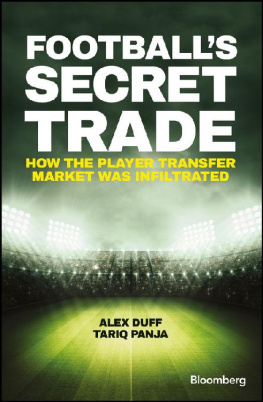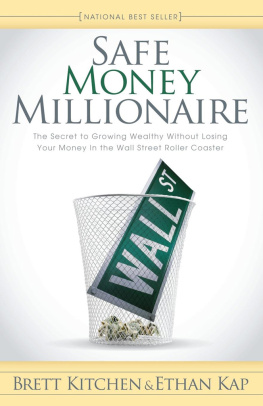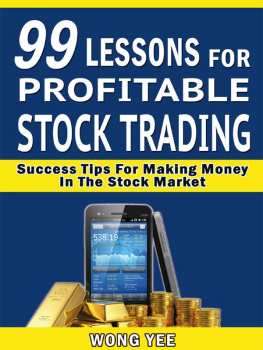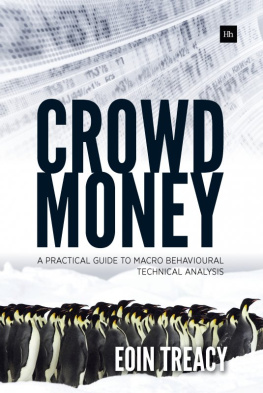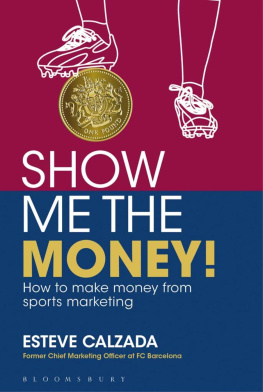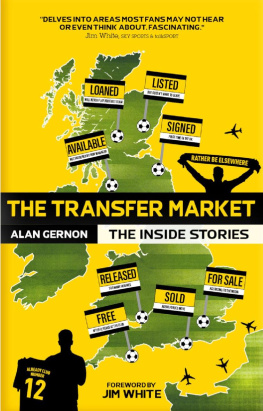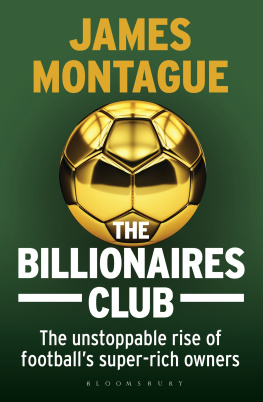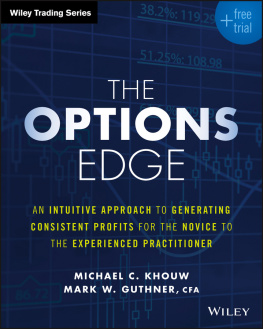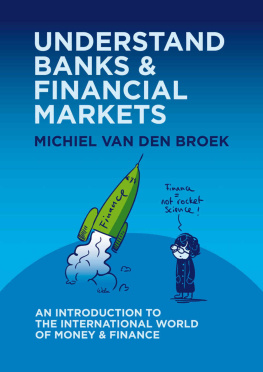Contents
Guide
Pages
Since 1996, Bloomberg Press has published books for financial professionals, as well as books of general interest in investing, economics, current affairs, and policy affecting investors and business people. Titles are written by well-known practitioners, BLOOMBERG NEWS reporters and columnists, and other leading authorities and journalists. Bloomberg Press books have been translated into more than 20 languages.
For a list of available titles, please visit our website at www.wiley.com/go/bloombergpress.
Football's Secret Trade
How the Player Transfer Market was Infiltrated
Alex Duff
Tariq Panja
This edition first published 2017
2017 Alex Duff and Tariq Panja
Registered office
John Wiley & Sons Ltd, The Atrium, Southern Gate, Chichester, West Sussex, PO19 8SQ, United Kingdom
For details of our global editorial offices, for customer services and for information about how to apply for permission to reuse the copyright material in this book please see our website at www.wiley.com.
All rights reserved. No part of this publication may be reproduced, stored in a retrieval system, or transmitted, in any form or by any means, electronic, mechanical, photocopying, recording or otherwise, except as permitted by the UK Copyright, Designs and Patents Act 1988, without the prior permission of the publisher.
Wiley publishes in a variety of print and electronic formats and by print-on-demand. Some material included with standard print versions of this book may not be included in e-books or in print-on-demand. If this book refers to media such as a CD or DVD that is not included in the version you purchased, you may download this material at http://booksupport.wiley.com. For more information about Wiley products, visit www.wiley.com.
Designations used by companies to distinguish their products are often claimed as trademarks. All brand names and product names used in this book are trade names, service marks, trademarks or registered trademarks of their respective owners. The publisher is not associated with any product or vendor mentioned in this book.
Limit of Liability/Disclaimer of Warranty: While the publisher and author have used their best efforts in preparing this book, they make no representations or warranties with respect to the accuracy or completeness of the contents of this book and specifically disclaim any implied warranties of merchantability or fitness for a particular purpose. It is sold on the understanding that the publisher is not engaged in rendering professional services and neither the publisher nor the author shall be liable for damages arising herefrom. If professional advice or other expert assistance is required, the services of a competent professional should be sought.
A catalogue record for this book is available from the Library of Congress.
A catalogue record for this book is available from the British Library.
ISBN 978-1-119-14542-4 (hardcover) ISBN 978-1-119-14545-5 (ebk) ISBN 978-1-119-14544-8 (ebk)
Cover design: Wiley
Cover image: efks/iStockphoto
Prologue
This book began with a riddle. We wanted to know why a company based in a redbrick house in the English town of Rochdale was lending 2 million to two-time European champion FC Porto to sign a striker. The company listed its address as 35 Princess Street, a scruffy part of town neighbouring abandoned buildings with bricked-up windows, an advice centre for the homeless and a builder's yard. CCTV cameras pointed at the front door.
It was 2010 and the Portuguese club had recently reached the last 16 of Europe's Champions League with a squad that included Radamel Falco, Givanildo Vieira de Sousa better known by his nickname of Hulk and Nicols Otamendi. Over the next few years these three players, from Colombia, Brazil and Argentina, would subsequently fetch transfer fees totalling more than 150 million and play at some of Europe's most illustrious stadiums, including Manchester United's Old Trafford and Manchester City's Etihad Stadium, a dozen or so miles away from that ordinary Rochdale house.
As the new season got underway, Porto used the 2 million loan to help finance the signing of a striker to provide cover for Falco and Hulk. Walter da Silva, who had been raised by his mother in a Brazilian slum, was very much an unproven talent, even if he had made his debut in Brazil's Under-20 national team a year earlier.
A second company, based in London's Chancery Lane, provided another 2 million to help finance the 6 million signing. Porto's published accounts showed that this company had acquired 25% of the transfer rights of the striker. That meant it would take a quarter of any fee the striker fetched if Porto traded him to another team before his five-year contract expired.
If Da Silva went on to became as sought-after as Falco, Hulk and Otamendi, it could turn into a lucrative investment. Although it took us three years of digging to find out who the owners of both companies were, it was clear from the start what they were doing: seeking financial returns from the football player transfer market.
Transfer fees have been part of the game since 1890, when they were introduced by the English Football Association to compensate smaller teams for losing their best players to larger clubs. Back then, there was already fierce competition among English clubs for the best talent and the manager of Preston North End, then one of the leading teams, tempted amateur players from the Scottish dockyards with money and jobs such as running a pub.
Transfer fees took longer to catch on in Italy, Spain and Germany, but were later adopted worldwide by the sport's world ruling body, the Fdration Internationale de Football Association (FIFA). FIFA regulates the thousands of cross-border transfers that take place each year.
Over the last 20 years, the international transfer market has mushroomed sevenfold in size, into a 4 billion-a-year business. The boom has been fuelled by a steady increase in income from broadcasters and an influx of billionaire owners into the game, such as Russian oligarch Roman Abramovich and Abu Dhabi's Sheikh Mansour bin Zayed Al Nahyan, who own Chelsea and Manchester City, respectively.
It was also underpinned by something else: clubs perpetually engage in panic buying of players. In 2014, Ebru Kksal, a former Morgan Stanley banker who was general secretary of Turkish club Galatasaray, explained to a room full of football financiers in Zurich: When the Galatasaray president has a stadium full of people chanting for him to resign, he goes to the boardroom and says: sign three players. Even if, she added, the finance director says we can't afford to do that. I'm not proud to say that for the last 10 years we've been carrying negative cash flows.
Across the game's European heartland a similar theme played out. In a study of 44 teams that year, S&P Capital IQ deemed every single one including 20-time English champion Manchester United below investment grade (sometimes known as junk grade). That's because they were ploughing most of their revenue into transfer fees and player wages in an effort to appease impatient supporters, win trophies and collect more prize money and sponsorships.
Today, the player transfer merry-go-round consumes the interest of the sports sections of tabloid newspapers and football websites, as supporters hungrily consume speculation about which player might fortify their team. The frenzy reaches a climax in Europe on August 31st and January 31st, when sleep-deprived lawyers and agents criss-cross the continent on planes trying to finalize deals before the midnight trading deadline in Europe, where most money is spent. Occasionally, they carry suitcases of cash to help ensure deals go through.

